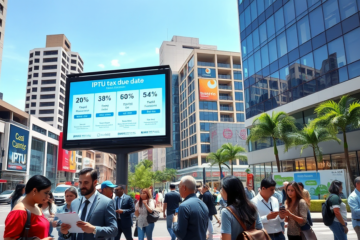Government Allows Peso Devaluation and Volatility
Devaluation of the Peso Argentine is a topic that has generated concern and discussion in the current economic scenario.
In this article, we will explore how the Argentine government has dealt with the currency devaluation, the interventions of the Treasury and the Central Bank, and the implications that all of this has for the country's economy.
We will also address the critical situation of foreign currency reserves, the initial recovery of assets, and market volatility amid political uncertainty, especially with the legislative elections scheduled for October.
The impact of necessary economic reforms will be a key part of this analysis.
Controlled Devaluation and Exchange Rate Context
The Argentine government's recent decision to release the peso's devaluation reflects an attempt to address growing pressure on foreign currency reserves and avoid a deeper currency crisis.
This movement occurred in a context of economic uncertainty, where maintaining the stability of the peso was becoming unsustainable, leading to fears of a run on dollars by the population and investors.
With reserves falling to less than US$1.1 billion, exchange rate adjustment has become a necessary measure to preserve confidence in the national economy.
Treasury Intervention in the Foreign Exchange Market
The Argentine Treasury has adopted a significant strategy in the foreign exchange market to support the Argentine peso.
Initially, there was a daily expenditure of about US$ 100 million in an attempt to stabilize the currency.
This large-scale intervention sought to contain the effects of the devaluation, but it was unsustainable in the long term.
Thus, adjustment measures were necessary, including the gradual reduction in dollar offers.
Full news highlights that this approach allowed the Treasury to redirect resources without causing greater instability in the market.
Economists indicate that “These actions were crucial to mitigate risks.
“
Central Bank Action and Sale of Dollar Contracts
The Central Bank of Argentina took firm action by selling dollar contracts in order to defend the Argentine peso.
Immediate pressure on reserves occurs with the aggressive intervention, aiming for momentary stability in the face of market volatility.
However, this action reveals its limitations, as the legal ceiling for these operations is being reached.
Consequently, international reserves, now less than US$1.1 billion, face a growing threat of depletion.
While the market remains tense, economic reforms become urgent to change this scenario.
Every decision by the government and the Central Bank influences confidence in the economy, highlighting the complexity of the situation.
Falling Foreign Exchange Reserves and Maneuver Limits
Argentina's foreign exchange reserves are at an alarming level, below US$1.1 billion, highlighting serious limitations for future foreign exchange interventions.
Amidst a scenario of market volatility, this reduction makes it imperative to evaluate the effectiveness of the policies adopted.
Considering recent data, a worrying trend emerges, as shown in the following table:
| Month | Reserves (US$1.4 billion) |
|---|---|
| March | 1,9 |
| April | 1,4 |
| May | 1,1 |
.
With reserves falling, the Central Bank's ability to maneuver to stabilize the peso is significantly impaired.
The situation prevents the use of dollar contract sales as a sustainable tool.
Furthermore, the according to the IMF imposes additional obligations, demanding from Argentina an accumulation of reserves that, in the current context, seems challenging.
Thus, current reserve constraints not only undermine economic stability but also create uncertainty about future policy direction.
Market Volatility and Pre-election Pressures
The legislative elections scheduled for October in Argentina have significantly intensified distrust in the peso and kept market volatility at high levels.
The devaluation of the peso, followed by government interventions to stem a massive flight to the dollar, reflects the urgency of structural economic reforms.
With foreign currency reserves at critically low levels, pressure on Javier Milei's government is increasing significantly as elections approach, the results of which remain uncertain.
The recent withdrawal of buy recommendations by institutions like Morgan Stanley highlights how political and economic instability generates substantial uncertainties in the markets (exam on volatility in Argentina).
The combination of questionable monetary policy and the urgency for long-term structural reforms places the Argentine economy at a critical point of vulnerability, intensifying exchange rate volatility and the peso's slump.
Devaluation of the Peso and the actions of the Argentine government highlight the fragility of the local economy.
Uncertainties persist and, without significant reforms, pressure on the currency and the market will continue, reflecting an unstable economic scenario in the coming months.



0 Comments